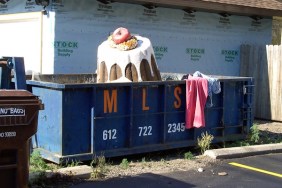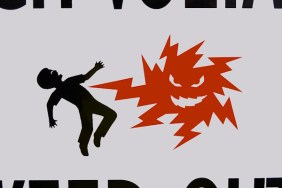The inescapable cycle of life, death and decay will have its way with us all, and virtually everything else on earth… and while most people find this reality of nature less than pleasant, others seek to magnify and exploit it. Because while decay can certainly be disgusting – as some artists have portrayed with rotting animals – it can also be beautiful, like allowing the sea to etch a pattern into metal.
Dieter Roth
(images via: MOMA)
No collection of decay-themed art would be complete without the inclusion of Dieter Roth, whose entire oeuvre challenged the notion that art is immortal. Bananas, sausage and dung are just a few of the items Roth used to create pieces that blossomed with maggots and mold, falling victim to the relentless cycle of life and death even under the harsh lights of exclusive art galleries. Certainly the bust of chocolate that he made of himself, covered in birdseed and threw into a courtyard as a feast for birds looks very different than it did when he created it.
Dan Dempster
(image via: wikimedia commons)
The sea is a great and mysterious artist, carving rocks and scouring patterns into sunken man-made objects with its relentless tides and currents. Bermuda artist Dan Dempster submerged pieces of steel into the ocean and let it etch patterns into the surface with a rusty, dreamy and utterly aquatic result.
Nathan Slate Joseph
(images via: sundaram tagore gallery)
Many artists whose work is displayed outdoors dread the process of weathering; they lacquer and protect their work as much as possible to defend it against fading, rust, and other hazards of wind and rain. But Nathan Slate Joseph intentionally leaves squares of steel outdoors to “empower nature by allowing it to have a hand in the making of his art.” He even applies acids to facilitate the breakdown of the pigments he applies to each square, letting them age and change naturally before soldering them together into one cohesive piece.
Damien Hirst
(images via: my modern met)
Renowned British artist Damien Hirst is known for making death a central theme in nearly all of his works, the most notable – and controversial – of which being a series made from animal corpses. One work featuring a rotting cow and bull was banned from gallery exhibition by New York public health officials for fear of “vomiting among the visitors”. Another, “A Thousand Years”, consisted of a rotting cow’s head in a glass case, covered in maggots and flies. But not all of Hirst’s dead animals are left to the ravages of nature – some are preserved in formaldehyde, like his iconic (and somehow simultaneously iconoclastic) shark.
Tony Reason
(images via: tonyreason.com)
Rust is a powerful pigment, with its vivid hues of red and orange that it lends to all sorts of metals, whether desired or not. British artist Tony Reason must see a great beauty in rust, because he has made it the center of much of his work: giant metal panels with rust designs and even rust mixed with wax and painted on canvas.
Kathy Kelley
(image via: artslant)
Few artists enjoy being told that their work looks like a bunch of trash – but Kathy Kelley knows that that’s exactly what her sculptures are. Kelley, who holds an MFA in graphic design, turned to “revaluing objects of refuse” with her large-scale found-object sculptures, saying “I am drawn to the symbolic and formal elements of decay, the way in which an object has been altered by its mere existence. The worn, broken, torn nature of the aged object seems to make it more real, more honest. So I collect decayed urban refuse. I hold onto it for awhile. Cogitate. Eventually the formal and symbolic elements of the materials and my current research meld. Then I make.”
Matthew Barney & Elizabeth Peyton
(images via: c-monster)
Take one dead shark a la Damien Hirst, throw in some drawings that have been embellished by the sea over a period of a few months a la Dan Dempster, and you’ve got the strange collaborative project “The Blood of Two” by artists Matthew Barney and Elizabeth Peyton. Some of Peyton’s nautical-themed drawings were placed in a glass casket which was submerged in the ocean for months; the casket was ceremoniously lifted from the sea and taken on a funeral-like procession to a slaughterhouse where the drawings were removed and replaced with a dead shark. The shark was later served to onlookers. Barney is also known for his performance art videos featuring sculptures made from uncooked tapioca, which were left to decay as they would.
Rosamond Purcell
(images via: zymmogyphic)
Did you ever imagine that a dead fish could be so beautiful? Rosamond Purcell collects such natural and man-made curiosities for her assemblage art, which pays tribute to decay in all forms, from the remains of dead creatures to worm-eaten books and rusted metal. Purcell sources most of her materials at a junkyard in Maine and turns them into art installations, sculptures, collages and other collections as documented in her book Bookworm: The Art of Rosamond Purcell.
Joseph Beuys
(images via: 2thewalls)
Artist Joseph Beuys worked with all sorts of unconventional materials, but they were never randomly chosen. Beuys used edible items like butter, sausage and chocolate in some works, knowing that they would transform and decay over time, changing the way that people reacted to each piece. Fat in particular played a large role, used to signify “chaos and the potential for spiritual transcendence”. The images above show how the work ‘Fat Chair’, which featured a triangular slab of butter on a wooden chair, evolved as it decayed.
Zhang Xiaotao
(images via: saatchi gallery)
Perhaps hang Xiaotao’s art isn’t made directly from putrefying objects, but nearly as unusual is the desire to produce art that holds up decay as a subject worth portraying again and again. Xiaotao depicts moldy strawberries, rotting birthday cake, heaps of trash in the subway and ants feasting on forgotten food as lovingly as if they were stunning landscapes and beautiful models. “I am creating something that is disappointing and yet has great hopes – a cycle of positive and negative energy that is in a constant state of renewal,” he told China Daily.







